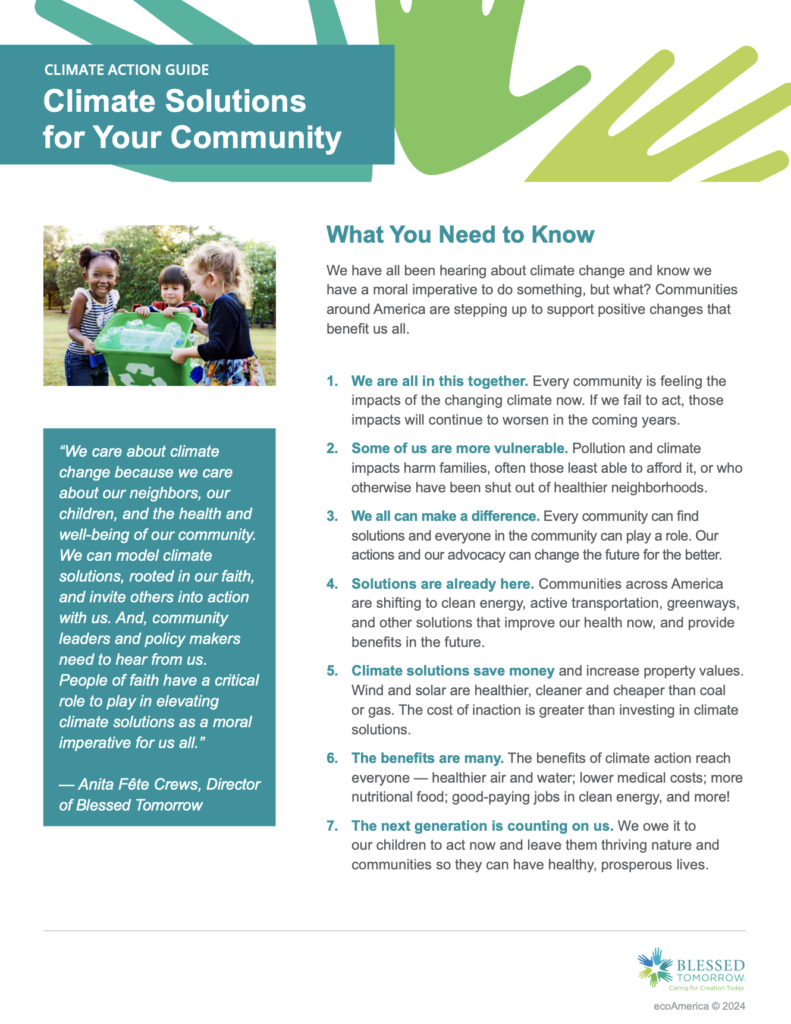Climate Solutions for Your Community
What You Need To Know
We have all been hearing about climate change and know we have a morel imperative to do something, but what? Communities around America are stepping up to support positive changes that benefits us all.
- We are all in this together. Every community is feeling the impacts of the changing climate now. If we fail to act, those impacts will continue to worsen in the coming years.
- Some of us are more vulnerable. Pollution and climate impacts harm families, often those least able to afford it, or who otherwise have been shut out of healthier neighborhoods.
- We all can make a difference. Every community can find solutions and everyone in the community can play a role. Our actions and our advocacy can change the future for the better.
- Solutions are already here. Communities across America are shifting to clean energy, active transportation, greenways, and other solutions that improve our health now, and provide benefits in the future.
- Climate solutions save money and increase property values. Wind and solar are cleaner and cheaper than coal or gas. The cost of inaction is greater than investing in climate solutions.
- The benefits are many. The benefits of climate action reach everyone — healthier air and water; lower medical costs; more nutritional food; good-paying jobs in clean energy, and more!
- The next generation is counting on us. We owe it to our children to act now and leave them thriving nature and communities so they can have healthy, prosperous lives.

What You Need To Do
We can solve climate change, but we need public support to build the political will for collective action. Everyone can and needs to be part of solutions, including people of faith. Share your concerns and your ideas, focus on the benefits of solutions and the moral imperative to act.
- Go clean. Make sure your community uses and promotes clean energy like wind and solar to keep pollution low and save money. Electrify everything you can and use only renewable energy.
- Restore thriving nature for our physical and mental health. Plant trees, especially in low-income neighborhoods. They lower temperatures and clean our air and water. Clean waterways, wellmaintained parks and community gardens all help protect nature and our community.
- Promote Active Transportation. Biking and walking brings communities together and improves health. Advocate for greenways in your community that are accessible to all neighborhoods.
- Shop local. Support your local neighbors, merchants and farmers by buying local — and cut down on pollution in the process. Local parks, forests and attractions are as good as those far away!
- Be inclusive. Support people and neighborhoods that have been left out of climate solutions and decision-making because of racism, language barriers, or educational disparities.
- Connect with and support local officials who promote and set policies for greening the community, clean energy, smart growth, active transportation, better tree cover, open space and land conservation, and other climate solutions, and engage with them on issues around climate change. You can call or email them when important issues come up for a vote.
- Join a local organization working on climate issues. If there isn’t one in your area, start one! Be the faith voice on climate action.
We can solve climate change, but we need public support to build the political will for collective action. Everyone can and needs to be part of solutions. Share your concerns and your ideas, focus on the benefits of solutions. These easy steps can help you and your community get on the path to a healthier, more just, more sustainable, climatefriendly future.
“We care about climate change because we care about our neighbors, our children, and the health and well-being of our community.
We can model climate solutions, rooted in our faith, and invite others into action with us. And, community leaders and policy makers need to hear from us. People of faith have a critical role to play in elevating
climate solutions as a moral imperative for us all.”
— Anita Fête Crews, Director
of Blessed Tomorrow

